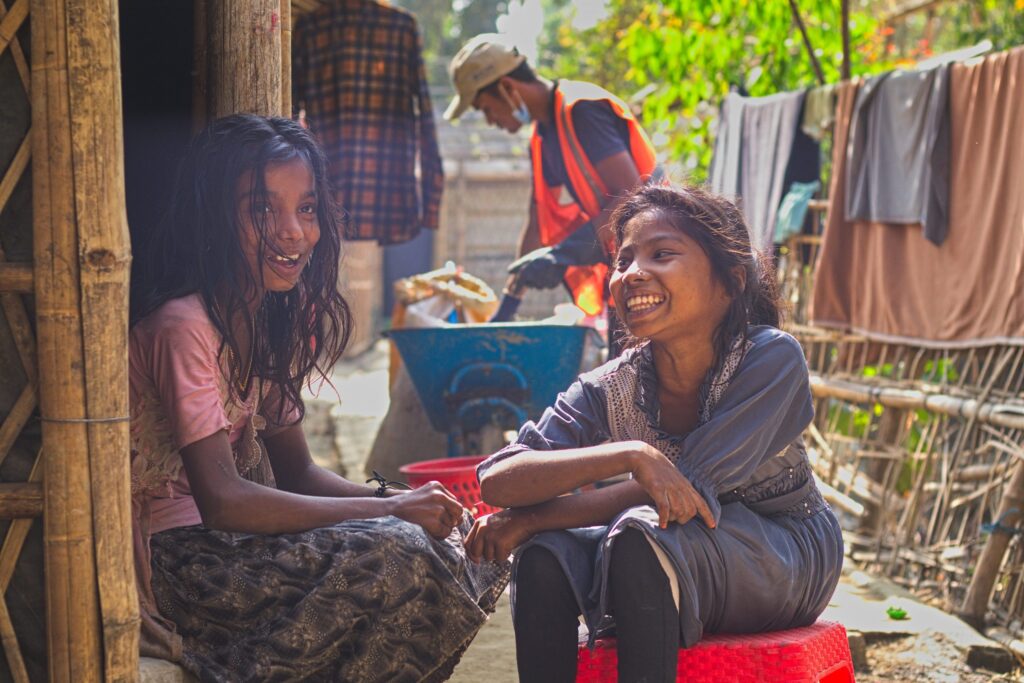Updates & Press
Uncategorized | February 1, 2023
Sex & Reproductive Health(SRH) Activity at Me
Author | MedGlobalComms

[vc_row][vc_column][vc_column_text]The birth rate in Rohingya refugee camps in Bangladesh is relatively high. This is likely due to a combination of factors, including high fertility rates among the Rohingya population, limited access to family planning services and education, and cultural norms that prioritize large families.
The camps themselves pose significant challenges to maternal and child health, including poor living conditions, limited access to healthcare, and a lack of trained healthcare providers. This can result in higher rates of maternal and newborn deaths and complications.
The United Nations and other humanitarian organizations are working to address these challenges by providing maternal and child health services, distributing family planning information and supplies and training local healthcare workers in the camps.
The population of the Rohingya people in Bangladesh totals more than 1.1 million people, with the majority of them living in the refugee camps in Cox’s Bazar.
The government of Bangladesh, the United Nations and other humanitarian organizations have been working to provide food, shelter, and other basic life-sustaining supplies to the Rohingya people, as well as educational and health services, including maternal and child health services.
It is important to note that many Rohingya families are large and have more children compared to other ethnic groups. The lack of access to family planning services and education, and cultural norms that prioritize large families may contribute to high fertility rates among the Rohingya population.
There have been efforts to provide birth control and family planning services to the Rohingya population in the refugee camps in Bangladesh. These
efforts are led by the government of Bangladesh, the United Nations and other humanitarian organizations.
The main activities that are taken to promote birth control in the Rohingya camps include:
- Distribution of family planning information and supplies: This includes providing education on different methods of birth control and distributing condoms, oral contraceptives, and other forms of birth control to those who request them.
- Training of local healthcare providers: This includes training local healthcare providers on how to provide family planning services and counseling to the Rohingya population.
- Community-based education and outreach: This includes working with community leaders and organizations to educate the Rohingya population about the benefits of family planning and to dispel myths and misconceptions about birth control.
Improvements in awareness of modern methods of FP among Rohingya refugees contributed to these results. Over 80% of CMWRA and recently delivered women (RDW) in the camps have heard about Injectable Depo-Provera and Oral Contraceptive Pills, and between 72% and 87% of CMWRA know where to access different methods of family planning.
There are challenges that have hindered the timely provision of the full range of contraceptive and MR services to all Rohingya refugees. These challenges in the refugee population are due to their vulnerability and transitional state of living and also to lack of understanding due to their traditional beliefs and cultural models.
These factors highlight the importance of the continuation of efforts to improve the family planning situation among Rohingya refugees in the coming years.
In order to implement such comprehensive family planning programs MedGlobal Health post is making an effort towards these initiatives alongside the Bangladesh Government and UN.[/vc_column_text][/vc_column][/vc_row][vc_row][vc_column][vc_single_image image=”48707″ img_size=”large” alignment=”center”][/vc_column][/vc_row][vc_row][vc_column][vc_column_text]It is important to note that access to family planning services for Rohingya refugees is still limited and there is a need for more efforts to be made in this area. The living conditions in the camps, limited access to healthcare, and cultural and religious factors pose challenges to providing family planning services to the Rohingya population.
MedGlobal needs your help for a better future for the FDMN population here in the Rohingya camp Cox bazar, Bangladesh.
*CMWRA: stands for Currently Married Women of Reproductive Age
*MR: menstrual regulation
*ANC: Antenatal Care
*PNC: Prenatal Care
*FDMN: Forcibly Displaced Myanmar Nationals
[/vc_column_text][/vc_column][/vc_row]


